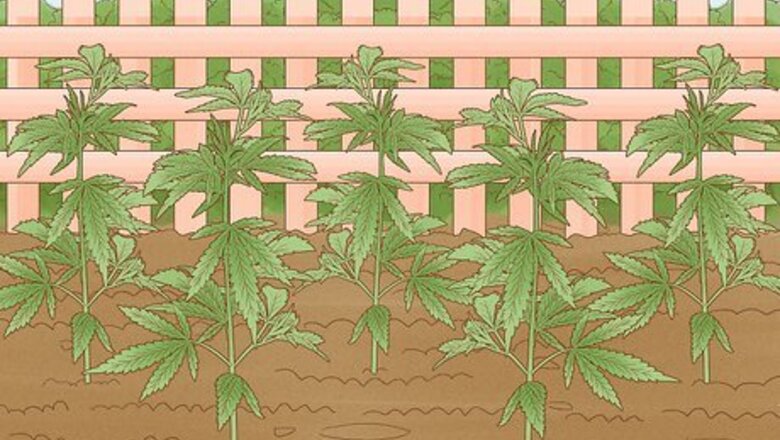
views
- To grow hydroponic marijuana, you’ll need a dedicated small room, like a closet or a small spare bedroom.
- Plant germinated marijuana seeds in rock wool blocks to grow your weed without soil. It usually takes 6-12 weeks for hydroponic weed to flower.
- Harvest the flower buds when their white fibers turn brown. Snip the buds, hang them to dry, and cure them in a sealed container for 2 weeks before consuming.
Supplies & Prep Work
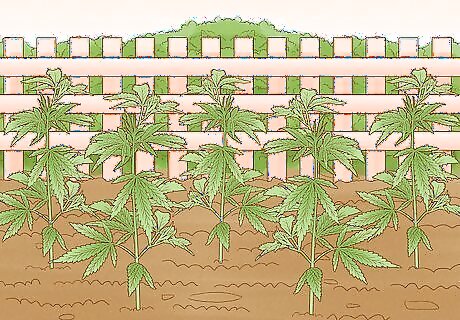
Consider growing cannabis in soil before growing hydroponic pot. Growing plants hydroponically is a bit more complicated than growing them in soil. You’ll need to purchase special equipment, and you’ll have to optimize your hydroponic garden for nutrients, light, and ventilation. If you’re new to growing weed, consider growing it the old-fashioned way first, then switch to hydroponic gardening. If you can’t grow pot in soil for whatever reason, you can still grow it first hydroponically. Consider growing other plants hydroponically before doing so with marijuana. This will help you become comfortable with hydroponic gardening. For instance, try growing hydroponic tomatoes, or create your own hydroponic mushroom garden.
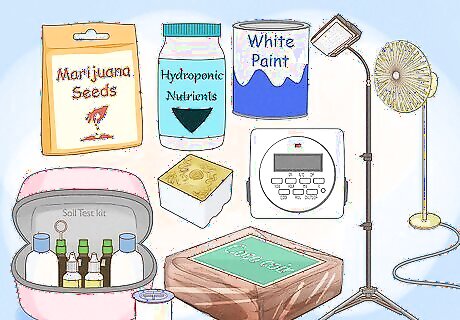
Obtain the necessary items for your hydroponic garden. Make sure you are legally allowed to purchase marijuana seeds and grow them for recreational consumption. Purchase your seeds from a legal dispensary, then buy the remaining items online or from a local gardening store: Marijuana seeds White paint Hydroponic nutrients Coco coir Rock wool blocks Grow lamps with CFL sockets (enough to cover all your plants) CFLs (Compact Fluorescent Lightbulbs) Timer pH test kit Fans for ventilation
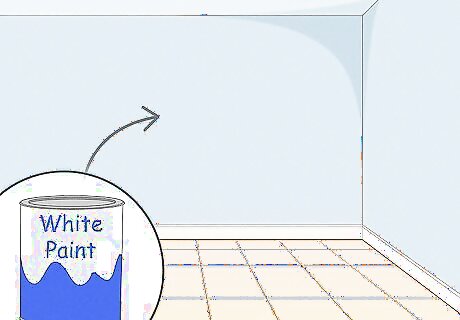
Choose a closet or small room for growing, then paint the walls white. The white paint makes the walls more reflective. This increases photosynthesis, which helps your plants grow. You can also cover the walls with metal foil, though this is not as reflective as clean white paint.
Lighting & Ventilation
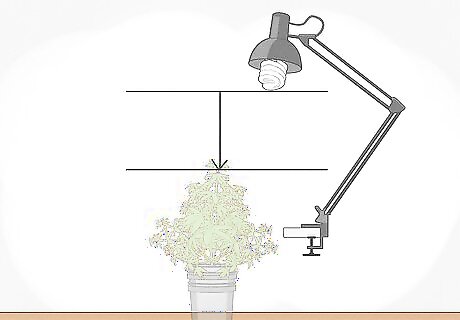
Hang CFL grow lamps above your grow area. Hang the lamps a little higher than the height of your pots, leaving room to raise them as your plants grow taller. Hang the lights from a bar, like the kind found in a closet, or clamp them onto something nearby that is the right height. Use clamp lamps for simplicity. These come with built-in CFL sockets and don’t require extra wiring or electrical work. Their housing also helps reflect as much light as possible.
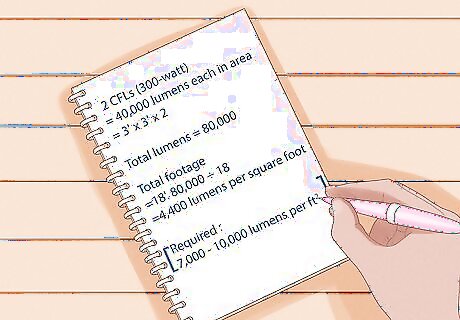
Give your plants at least 7,000 lumens/ft (75,000/m) of light. The brightness of light is measured in lumens per square foot (or square meter). The ideal brightness for a standard grow operation is 7,000-10,000 lumens per ft (75,000-107,000 lumens per m). To figure out how many lumens per square foot you're working with, simply divide the total lumens by the total square feet. Say you're working with two 300-watt CFLs—each with 40,000 lumens—in a 3' x 3' x 2' area. Your total lumens is 80,000 and your total footage is 18'. 80,000 ÷ 18 ≈ 4,400 lumens per square foot. To convert to square meters, multiply the number of lumens per square foot by 10.7. The absolute minimum needed to grow average-sized plants is around 3,000 lumens per square foot (32,000 lumens per square meter).
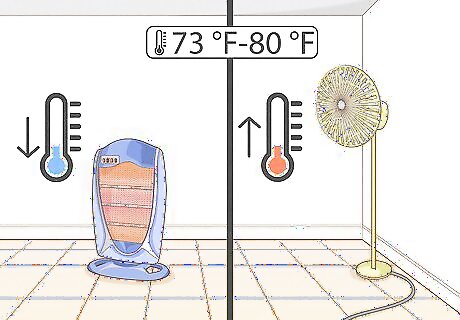
Keep your growing room between 73 °F (23 °C) and 80 °F (27 °C). This prevents your plants from overheating. Avoid burning or overheating your plants with your light source. Having sufficient light helps your marijuana grow tall, healthy, and potent. The maximum allowable temperature is 90 °F (32 °C). If the temperature gets too low, add a small heater to generate additional heat. If the temperature gets too high, add a fan to ventilate the space.
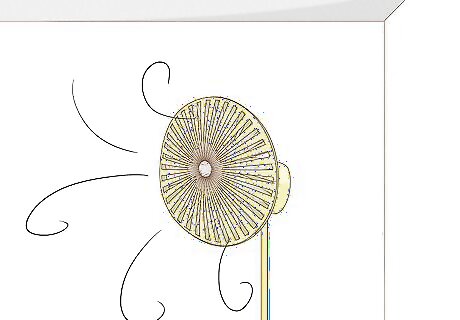
Add fans to ventilate your growing room. Proper ventilation is absolutely necessary for vibrant plants. If your grow room is in a closet, for example, there's not much more that you can do other than an oscillating fan. In a box, however, adding a duct system is efficient for many home growers. To make a duct system, use a squirrel cage fan (it looks like a hamster wheel) attached to 6 in (15 cm) ducts to mitigate rising temperatures and pungent odors. Include an extra oscillating fan to help strengthen the stalks of the marijuana plants as they grow.
Germinating & Planting
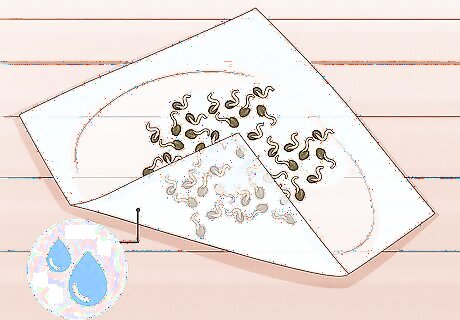
Germinate your marijuana seeds. Wet a large paper towel and lightly wrap your marijuana seeds in between the paper towel. Place the paper towel on a flat surface, then cover it with a plate to make sure the paper towel doesn't dry out. Let them sit for 24 hours. You can also place the damp paper towel and seeds in a sealable plastic bag.
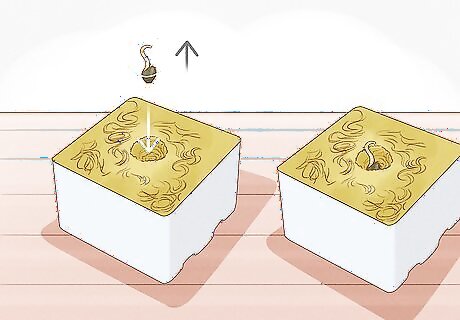
Plant the germinated seeds in rock wool blocks. Use your fingers or a spoon to dig a small hole in the rock wool block, then place the germinated seed in the hole with its sprout pointing up. Once the seedling has started sprouting a significant root system, you transfer it into the coco coir. You can purchase rock wool blocks and coco coir online, or from your local gardening supply store.
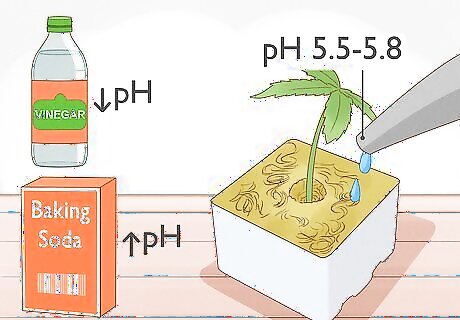
Give your plants nutrients-infused water with a pH of 5.5-5.8. Use a pH test kit to measure the water’s pH, then adjust the pH to be within 5.5-5.8. To lower the water’s pH, add a squirt of vinegar. To raise the pH, add a pinch of baking soda. You can purchase liquid hydroponic nutrients online, or visit a gardening center. Start by giving your plants nutrients at quarter strength, then gradually increase to full strength over 1-2 weeks. Excess nutrients may hurt your plant. This system is a type of “passive” hydroponic farming. Unlike “active” hydroponic systems, it doesn’t require special equipment for pumping water to give nutrients to your plants. Passive hydroponic systems are easy to set up and maintain, but building an active hydroponic system may produce larger crop yields.
Water, Light, & Nutrients
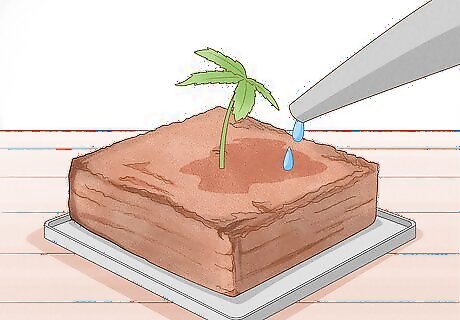
Keep the coco coir moist with pH-balanced, nutrient-filled water. Do this whenever the coco noir starts to feel dry to the touch. The plants will absorb water more quickly as they grow. Therefore, you may only need to water them every couple of days when they're small, and once a day towards the end of the plant's flowering cycle, when they’re fully grown. Ensure that at least a little extra run-off water comes out the bottom of the container whenever you water your plants to ensure that unused nutrients don't build up in your medium. Coco coir is very forgiving if you accidentally over or under-water your plant, but make sure to adjust your watering schedule accordingly if you notice your plant's leaves are wilting or drooping.
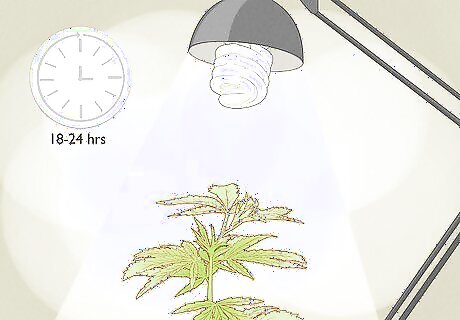
Give your plants 18-24 hours of light per day. This keeps them in the vegetative stage, which prevents them from growing flowers prematurely. If growing in a closet, keep your plants in the vegetative stage until they're 6-18 inches (15-45 cm) tall. Your marijuana has two major growth phases after it's a seedling—the vegetative and flowering stages. During the vegetative stage, your marijuana plants are only worried about growing and getting big. Keep your plants in the vegetative stage by giving them 18-24 hours of light a day. This simulates summer, when the days are long. The height of the plant is often the main factor when determining how long to keep your marijuana plants in the vegetative stage. Your plant can double its height in the flowering stage, so make sure to keep the plant in the vegetative stage until it's about half its desired final height.
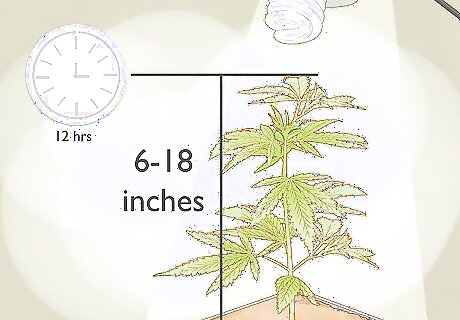
Give plants 12 hours of light daily once they’re 6 to 18 in (15 to 46 cm) tall. This makes them transition to the flowering stage. The 12 hours of daylight simulates the transition to fall/winter, causing your plants to produce buds. During the flowering stage, your plants devote energy to growing flowers/buds.
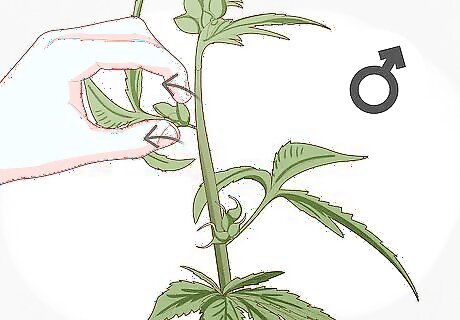
Get rid of any male plants. The first signs of your plant's gender will appear 1-2 weeks after you switch the lighting time to 12 hours per day. Female plants grow white hairs, while males grow grape-like balls that eventually become pollen sacs. Discard the male plants. Males pollinate females, causing females to start diverting energy from THC production into seed growth. To maximize the amount of bud you get, remove any male plants so they don't pollinate your females.
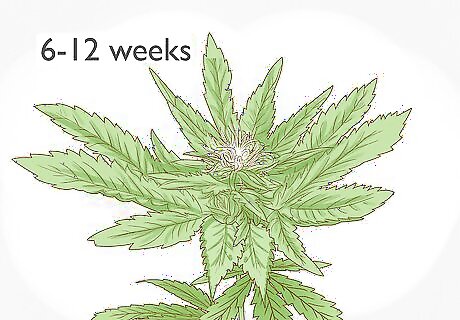
Give your plants 6-12 weeks to complete the flowering stage. This allows flowers to develop, which you’ll harvest at the end of the flowering stage. Be patient and allow your plants to mature. This maximizes the amount of THC in their buds. Keep watering them with pH-balanced nutrient-enriched water.
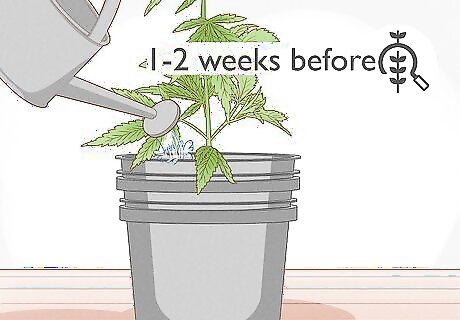
Water with plain, pH-balanced water for 1-2 weeks before harvest. Adjust the pH to 5.5-6.0 at this stage. Don’t add the nutrient mixture anymore, or you may actually be able to taste the nutrients in your final buds. Toward the end of your plant's flowering cycle, you may notice that some of the oldest leaves start turning yellow and falling off. This is totally normal and is a sign that your plant is taking nitrogen out of the leaves and putting them into the buds/flowers. This signals that your plants are almost ready to be harvested. Stop giving your plants nutrients with their water for the last 1-2 weeks to ensure the best possible taste of your final bud.
Harvesting & Curing Your Marijuana Buds
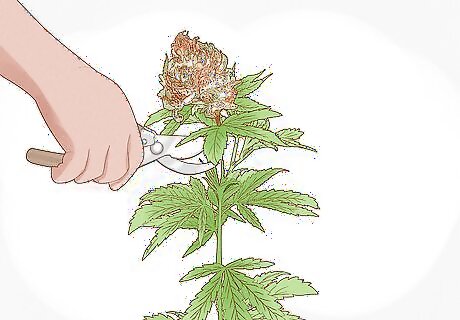
Harvest your plants by cutting off buds one at a time. You can also cut down the whole plant, then clip off the buds. Wait until 50-75% of the white pistils/hairs have turned amber/brown before harvesting. Alternatively, you can wait until the trichomes (also known as crystals or resin glands) are either all white/milky or half white and half amber. Harvesting earlier produces marijuana that induces a thoughtful, “in-your-head” high. Harvesting later provides a heavier, more relaxing marijuana experience.
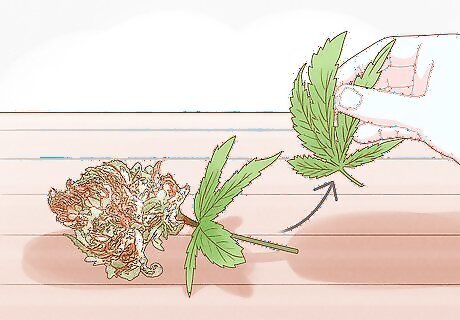
Clip any leaves sticking out from the buds. Leaves don't contain much THC and make your final smoke much more harsh. Remove these for a more pleasant smoking experience. Leave the stems for now. You can save the leaves and use them to make pot butter.
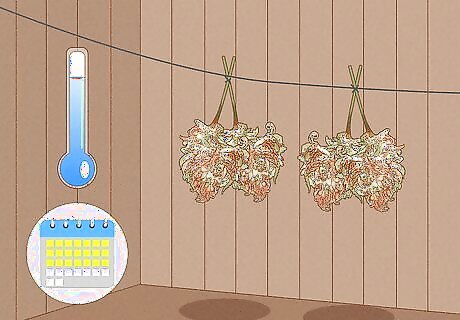
Hang your buds up to dry for 1-3 weeks. Hang the buds upside down in a cool, dark place. Let them dry out until the buds snap off the stem (as opposed to just bending) when you apply pressure.
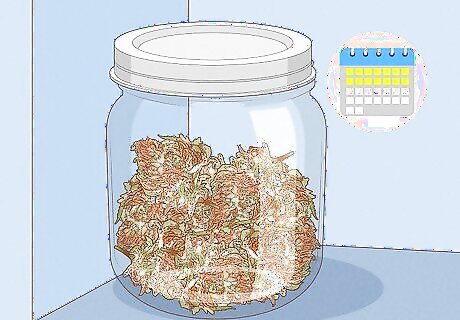
Leave the dried buds in an air-tight container for 2 weeks. This “cures” the buds, increasing their shelf life and improving their flavor and aroma. Open the jar once a day to get some air ventilation and release any moisture. Your cured buds can be smoked, vaped, or used to make edibles. Moisture may cause mold, so make sure your buds are completely dried before curing them.















Comments
0 comment